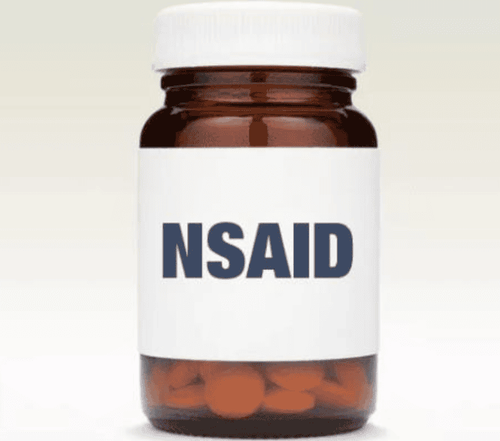This is an automatically translated article.
Non-steroidal anti-inflammatory drugs are widely used in medicine. This is a group of drugs for pain relief and anti-inflammatory effects in many different diseases. One of the active ingredients of this group of drugs is Etodolac. So what does Etodolac do?1. What effect does Etodolac have?
What is Etodolac? Etodolac is an effective pain reliever, reducing swelling. The drug is often prescribed for pain, swelling, and stiffness caused by arthritis. Etodolac is an active ingredient in the group of non-steroidal anti-inflammatory drugs (NSAIDs). Etodolac works by stopping the body from producing certain natural substances that cause inflammation.If the patient is being treated for a chronic condition such as arthritis, ask the doctor more about non-pharmacological treatments.
2. Instructions for using Etodolac
Carefully read the medication instructions provided by the pharmacist before starting to use Etodolac. Etodolac is to be taken by mouth as directed by your doctor, usually 2 or 3 times a day with a full glass of water (8 ounces/240 ml). The patient should not lie down for at least 10 minutes after using Etodolac. To prevent stomach upset, patients should take Etodolac with food, milk, or an antacid.
The dose of Etodolac is prescribed based on the patient's medical condition and response to treatment. To reduce the risk of stomach bleeding and other side effects of Etodolac, take it at the lowest effective dose and use it for the shortest possible time to ensure treatment. Do not increase your dose of Etodolac on your own or take Etodolac more often than directed. For conditions that are easy to recur, such as arthritis, continue taking Etodolac as directed by your doctor.
If a patient is prescribed Etodolac "as needed" (not on a regular schedule) it should be remembered that pain relievers work best if taken at the time the first signs of pain appear. If you wait until the pain gets worse, the painkiller Etodolac may not be as effective.
For some medical conditions, it may take up to 2 weeks for a person to take this medicine regularly to get the full benefit from it.

Sử dụng thuốc Etodolac theo đúng chỉ dẫn của bác sĩ
3. Etodolac side effects
Etodolac side effects may occur such as: stomach upset, nausea, diarrhea, drowsiness or dizziness, if any of these effects persist or worsen, the patient should inform the doctor. doctor or pharmacist for appropriate treatment.
Etodolac can increase your blood pressure, so check your blood pressure often and let your doctor know if the reading is higher than normal.
The doctor should be told immediately if the patient develops any of the following serious side effects while taking Etodolac:
Easy bruising, easy bleeding; Difficulty swallowing, painful swallowing; Changes in hearing (tinnitus); Mood swings; kidney problems (change in the amount of urine); Unexplained stiff neck ; Vision changes; Symptoms of heart failure (such as swollen ankles, swollen feet, unusual tiredness, unusual and sudden weight gain). Etodolac rarely causes serious (possibly fatal) liver disease. However, patients should be aware of any symptoms of liver damage including: dark urine, nausea, vomiting, loss of appetite. persistent eating, stomach pain, abdominal pain, yellow eyes, jaundice.
Very serious allergic reactions to Etodolac are very rare with the following signs: rash, itching, swelling, dizziness, trouble breathing.
4. Notes when using Etodolac
Before taking Etodolac, tell your doctor or pharmacist if you are allergic to Etodolac, aspirin, other NSAIDs (such as ibuprofen, naproxen, celecoxib) or any other allergies.
Patient's medical history should also be noted, especially of:
History of asthma (including shortness of breath or worsening breathing after taking aspirin or any other NSAID) Blood disorders (deficiency) blood, bleeding problems, blood clotting disorders ); Nasal polyps ; Heart disease (heart attack); High Blood Pressure; Liver failure; Stroke; Stomach and bowel problems (hemorrhage, heartburn, ulcers).

Thận trọng khi sử dụng thuốc Etodolac trên bệnh nhân có tiền sử đau tim
Kidney problems can sometimes occur with the use of NSAIDs, including Etodolac. Patients are more likely to develop dehydration, heart failure, or existing kidney disease. Accordingly, the elderly or if the patient is taking certain medications can affect the kidneys. You need to drink plenty of fluids as directed by your doctor to prevent dehydration and tell your doctor immediately if there is a change in the amount of urine.
Etodolac may make you dizzy or drowsy, so do not drive, use machines, or do anything that requires alertness until you can be sure it is safe for you.
Etodolac can cause stomach bleeding. Daily use of alcohol and tobacco, especially when combined with Etodolac, can increase the risk of stomach bleeding.
Etodolac may cause the user's skin to become more sensitive to the sun. Older adults may be at greater risk of gastrointestinal bleeding, kidney problems, heart attack, and stroke when using Etodolac.
Before using Etodolac, women of childbearing age should talk to their doctor about the benefits and risks, let the doctor know if the patient is pregnant or if they are planning to become pregnant. Etodolac may harm an unborn baby and cause problems with normal delivery. Therefore, Etodolac is not recommended for use during pregnancy from 20 weeks until delivery.
If your doctor decides that you need Etodolac between 20 and 30 weeks of pregnancy, then you should use the lowest effective dose of Etodolac for the shortest time. Etodolac should not be used after 30 weeks of pregnancy.
5. Etodolac interactions
Drug interactions can change the way Etodolac works or increase the risk of serious side effects. Products that may interact with Etodolac include: aliskiren, ACE inhibitors (such as captopril, lisinopril), angiotensin II receptor blockers (such as losartan, valsartan), cidofovir, corticosteroid anti-inflammatory drugs (prednisone.. .), lithium, diuretics (such as furosemide).

Thuốc Etodolac có thể tương tác với một số loại thuốc khác
Etodolac may increase the risk of bleeding when taken with other medicines that can also cause bleeding including:
Antiplatelet drugs such as clopidogrel; Anticoagulants such as dabigatran, enoxaparin, warfarin. Double-check all labels of prescription and nonprescription medications the patient is taking, as many medications may contain pain-reducing ingredients (aspirin, NSAIDs such as celecoxib, ibuprofen, or ketorolac). These drugs are structurally similar to etodolac and may increase the risk of side effects if taken together. However, if a doctor has directed the patient to take low-dose aspirin to prevent heart attack or stroke (usually at doses of 81-325 milligrams per day), then the patient should continue to take aspirin as prescribed, not spontaneously. drug discontinuation.
Etodolac overdose symptoms may include: severe stomach pain, difficulty breathing, extreme drowsiness. Tests such as blood pressure measurement, complete blood count, liver/kidney function... should be performed periodically to monitor disease progression or check for Etodolac side effects.
For patients with arthritis, lifestyle changes (such as weight loss if overweight, strengthening/conditioning exercises) can help improve flexibility and joint function. Etodolac is an effective pain reliever and swelling reducer. The drug is often prescribed for pain, swelling, and stiffness caused by arthritis. In order for the drug to work best, the patient needs to take it as prescribed. When there are abnormal signs, it is necessary to go to medical facilities for examination and treatment.
Please dial HOTLINE for more information or register for an appointment HERE. Download MyVinmec app to make appointments faster and to manage your bookings easily.
Reference source: webmd.com













